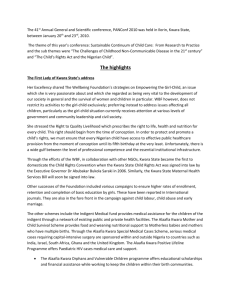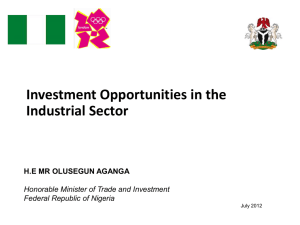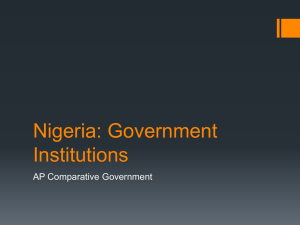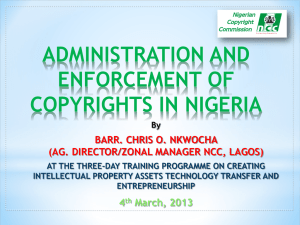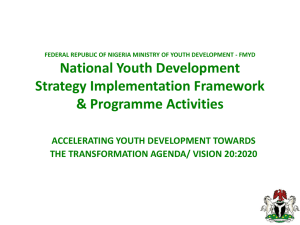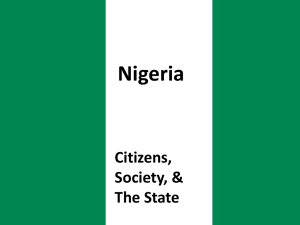re-engineering educational management for
advertisement
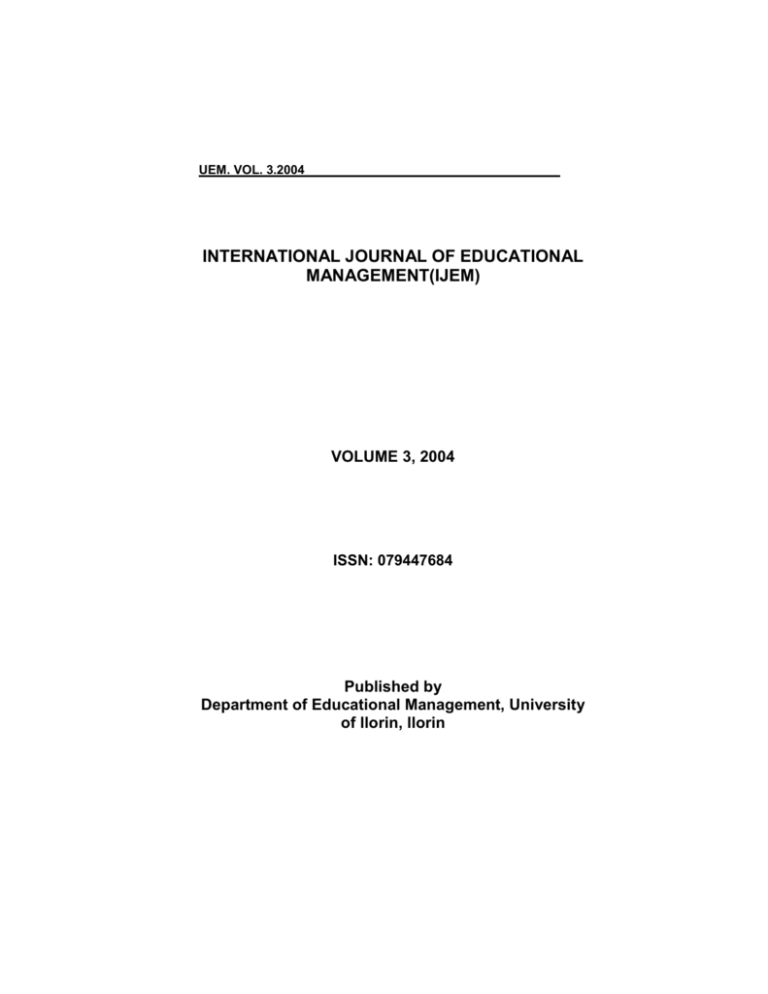
UEM. VOL. 3.2004 INTERNATIONAL JOURNAL OF EDUCATIONAL MANAGEMENT(IJEM) VOLUME 3, 2004 ISSN: 079447684 Published by Department of Educational Management, University of llorin, llorin IJEM, VOL. 3, 2004 Table of Content Page Title Page.................................................................i Copyright page..........................................................ii Board of Editors........................................................iii Notes to contributors.................................................iv Notes on contributors...................................................v Table of contents......................................................vii Prof. (Mrs.) N.Y.S Ijaiya - Re-Engineering Educational Management for Quality Education in Kwara State, Nigeria....................................1 2. Prof. Bade A. Agboola -Current Issues in Educational management in Nigeria: The Challenges of Open and Distance Education………………………………………….........15 3. Dr. M.A. Ogunu - The Present Status of Expectancy Theory..............................................................................................31 4. Dr. (Mrs.) A,T. Alabi - Teacher Professionalism and Productivity: Management Perspective...............................................................44 5. Dr. A.A. Olaoye-- Sociological Perspective to Managing School Curriculum and Resources............................................................54 6. Yahaya, Lasiele Alabi Ph.D - Relevance of Student- Assessment and Student- Advisement/ Counselling to Teaching........................77 7. Akinsolu, Abiodun Olatoun - HIV/AIDS Scourge Implications for Educational Planners in Nigeria.....................................................89 8. S.O. Afolabi - Lecturers' and Students' Perceptions on Influence of Supervision on Examination Malpractice in Kwara State-Owned Tertiary Institutions.......................................................................108 9. B.O. Gbadamosi - Forging Inter-Library Co-operation As a way of Enhancing Library Services: A case study of Resource sharing in three Academic Libraries in Oyo Township...................................122 10. Dr. Abdulrazaq Olayinka Oniye - Retirement stress and Management Strategies among Retired Civil Servants in Kwara State: Counselling Implication and Intervention........................................134 vii IJEM, VOL. 3, 2004 11. Dr. (Mrs.) E.Y. Obasa - Leadership Theory and the Nigerian Education Manager.....................................................................152 12. Ayinla Saadu Alanamu- Motivation and Teachers Productivity in Islamic Schools in llorin Metropolis………….........167 13. Dr. M.M. Aliyu - Availability and use of Instructional Materials in Teaching Business Education Subjects In Secondary Schools in Niger State..........................................180 14. Dr. (Mrs.) R.O. Oduwaiye - Influence of Role Conflict On Administrative Effectiveness of Academic Staff in Nigerian Universities..................................................................................190 15. Dr. (Mrs.) Opadokun, Olufunke Adeitan- Relationship Between Staff Retention Strategies and Academic Staff Productivity in Nigerian Colleges of Education................................................................200 16. Sofoluwe, A. Olu Ph.D. - Relationship Between Communication Technology (CT) and Administrative Effectiveness in Nigerian Universities...................................................................................216 17. Dr. (Mrs.) D.O. Otu-Cultural Implications of the Social System Theory for Effective Administration in educational institutions in Nigeria............................................................................................234 18. Dr. Y.A. Fasasi - Influence of School size on Discipline Among Secondary School Students in Osogbo and Olorunda Local Government Areas of Osun State................................................253 19. Dr. Kola Lafinhan - An Investigation into the Problems Confronting Schools for the Handicapped in Ibadan....................264 20. Dr. Amen Funsho Ahmed - The Relationship Student Personnel Services and Student Altruistic Behaviour in Nigerian Universities...................................................................................276 21. Dr. Virgy Onyene - Issues in the Administrative Behaviour of School Headteachers.................................................................. .. 294 22. Dr. N.B. Oyedeji -Manpower Planning in Education: The Role of Educational Administrator...............................................................318 viii IJEM, VOL. 3, 2004 RE-ENGINEERING EDUCATIONAL MANAGEMENT FOR QUALITY EDUCATION IN KWARA STATE, NIGERIA By PROF. (MRS) N.Y.S. IJAIYA Abstract Education is generally regarded in Kwara State as her major industry hence the need for its constant re-examination. The paper examined the present condition of education in the State and noted that its dwindling quality as depicted by poor pupil achievements in basic skills and public examinations is inimical to her progress and development. It attributed the situation to several factors such as over-centralization, poor investment by all stakeholders, more especially the lack of appropriate management policies by Government that could engender and inspire to healthy competition for better performance among schools etc. there is therefore a need, it was suggested, for a re-engineering of educational management in the State to bring about stronger accountability and motivation among school leadership, teachers. The state government should adopt strategic planning with statements of vision and mission backed by policies on acceptable standard in reading and computational skills, standardized tests among others. Introduction Educational reforms are not strange, as no educational system is perfect. All over the world, education continues to be subjected to questions like: what should be taught? Why? Where? How? By whom? Education is meant to serve the world. The world, itself, is not static. How can education be 1 IJEM, VOL. 3, 2004 static if it is to remain relevant? The decade 1990 to 2000 has been correctly referred to as the "Decade of World Summit", because the world witnessed a plethora (about 22) of international conferences mainly devoted to "Quality in Education" for human development. Among such conferences are "World Conference on Education for AH" held in 1990 at Jomtien and another in Dakar, 2000. Several important messages came out of these conferences, among which are: "an affirmation that education is a fundamental human right" and "an acknowledgement that Africa is at the bottom of the world's educational league table, and the fact that this should justify urgent, concerted, innovative responses" (Obanya, 2002, p.3). it was also noted that “political will is the key to success in all educational endeavours” (Obanya, 2002, p.3). Although it has been asserted on some occasions that education is an industry, and indeed a major one, in Kwara State, in thus writers view, the problem of this State's educational system is so deep and fundamental that it will take a total and radical re-engineering of the system to cure it of its ailment. The problems did not start today. Since the introduction of western education into Nigeria, the education system has been facing myriads of problems but in the last three decades, they have become increasingly complex. In the hurry to develop, the various Governments have made series of omissions and commissions which have continued to cripple the education system, and reforms have been patchy, inconsistent, mismanaged and therefore mostly ineffective. The system failed largely at the level of management. There is no gainsaying the fact that no educational system can rise above the quality of its management. The implementation of the National Policy on Education is a typical example; laudable programme but poorly executed. The ultimate aim of educational management is to 2 IJEM, VOL. 3, 2004 procure and marshal resources (man, money, materials and time) to ensure the achievement of educational goals and objectives. All management functions such as planning, organising, leading, supervising, controlling and motivating are directed toward achieving such objectives. The ultimate aim of education is to bring out the best in each individual for his benefit and that of the society. Education is an investment against poverty. Yet, Nigeria short- changes education to their own peril. It is not just the Government that is under- investing in education; parents, teachers, head teachers and students are equally guilty in various ways. The resources such as energy, time, money and materials committed to education by these groups continue to dwindle. People describe education as a social service (Olele, 1995) but it is much more than that. Nwagwu (1976) succinctly described the importance of education to human development as follows: today, education is universally accepted as a form of investment in human beings, which yields economic benefits or returns and contribute to a nation’s future wealth and development by increasing the productive capacity of citizens (p. 12). However, this can only happen where there is good quality education. The present state of education in Nigeria hardly merits that description. Public outcry and indignation about what their children learn in schools, the way they are being taught and their quality after graduation have been on the increase in recent times even from those who should carry out the reform. Education without quality is no education. It is a destroyer and a betrayal of trust. The problems facing education in Kwara State today are numerous. This paper will highlight some of them and then show how Government, by making appropriate policies, can improve the qualify of education in the State. 3 IJEM, VOL. 3, 2004 To carry out any educational reform, an accurate assessment of the present situation must be done. The paper will examine 'where we are' and 'where we ought to be' in Kwara State as far as the educational development is concerned, and make appropriate recommendations. ‘Where We Are’ Kwara State, created in 1967, can be regarded as a replica of Nigeria with several ethnic groups occupying both rural and urban settlements. Like Nigeria, it has the burden of educationally disadvantaged groups among which are some Local Government Areas, girl-child and possibly boy-child groups too. There are over 220 public secondary schools, over 1000 primary schools, three Colleges of Education, one Polytechnic and one College of Arabic and Legal Studies to manage. Among her problems are: Poor Quality education- One of the major problems facing the State today is poor quality education. The indicators are quite visible: woeful performance in National Common Entrance Examinations, School Certificate Examinations and University Matriculation Examination (UME) in most subjects, especially in Sciences, English and Mathematics. Many who passed could have been aided through examination malpractice in one form or the order. Cheating to pass is already assuming a dangerous dimension in the State as it is in the country. Many students now migrate to rural schools for opportunity to cheat. Some Principals, headmasters and teachers illegally assist students to cheat. Many primary school products cannot read or write correctly in English or local language. Students dread English and Mathematics at any level. The primary level as a foundation is very weak and creates problems for the upper levels. As a teacher in a secondary school, this writer has encountered students in Form one (now JS1) as far back as 1980 who could not read the 4 IJEM, VOL. 3, 2004 alphabets. Ineffective teaching is the major factor responsible for this. Examination malpractice and cultism can be traced to it as students are not fully engaged in their studies. Ineffective teaching can also be traced to other factors. Quality in education is considered multi-dimensional, involving: the community, parents, teachers, students, school administrators, government, curriculum, funds and infrastructure (Obanya, 2002). Each of these elements has in one way or another eroded quality of education in the State. Planning: This involves the collection of data and systematic analysis for the purpose of appropriate decision making. Educational planning in Nigeria has not been helpful in promoting quality education. First, accurate data are hardly possible in Nigerian schools because of the politicisation of figures for financial gains by Government and some officials As long as the Federal Government continues to tie figures to budgetary allocation, there may be no correct school enrolment data in this country. Due to poor planning, the system has no clear cut direction. The National Policy on Education (NPE) is supposed to guide the operators of the system but it is shortsighted. It talks about the philosophy and objectives of Nigerian education at various levels but fails to proffer strategies for the implementation by the classroom teachers and how the students would know when they have reached acceptable level of performance. Also, the implementation of the NPE has been haphazard because of lack of strategies for implementing it. For instance, the intention of the 6-3-3-4 system is that students will branch after Junior Secondary (JS) exam to secondary, teacher training and technical schools based on their ability. But no sooner did the implementation begin than the States started to close the Technical and Grade II Teacher Training Colleges. What is being running now is actually 6-6-4 system. There are other deficiencies in the policy. It calls for a radical revision. 5 IJEM, VOL. 3, 2004 Quantity and Quality of Teachers: By far, the most serious factors eroding quality in the educational system are the quantity and quality of the teachers. The educational system suffers from both. This has been a perennial problem. Teachers are considered as the most important factor in student learning, a bridge between students and quality. Their deficiencies either in knowledge, pedagogical skills or motivation spells doom for the system. These are “among the sore points of basic education in Nigeria” (Tahir, 2001, p.6). At the inception of UPE and UBE, the Federal Government had to resort to crash teacher training to make up for the huge shortfall in teachers for the take-of of both programmes. This group of teachers have compounded the problem of quality in the system because the training is weak and no concrete programme was put in place at school level to improve them. In some countries, teachers are not regarded as qualified until they undergo one year of mentoring under experienced teachers and then evaluated. In some States in USA, new teachers have to take State examination before employment. In Nigeria, they are treated as finished products. In the secondary schools which the State has to cater for fully, the number of teachers continues to dwindle between 1992 and 2000 - 2003 as shown in Table 1. Table 1: Number of Teachers in Kwara State Secondary Schools 1992; 2000-2003 Year Total Number of Teachers 1992 5,298 2000 3,848 2001 3,833 2002 3,829 2003 3.825 Source: Kwara State Teaching Service Commission, llorin. 6 IJEM, VOL. 3, 2004 Table 1 shows that between 1992 and 2003, Kwara State has lost 1,473 teachers possibly to retrenchment, retirement, resignation and death. In the last four years, there was no replacement until this administration came on board and reinstated the formerly sacked teachers. In spite of this shortcoming, student enrolment continues to increase. These figures do not even fully capture the actual problem of teacher supply in Kwara State because they do not reveal the chronic shortage of teachers in all subjects. A study of selected schools carried out by Ijaiya (1999) shows that all the schools had this deficiency. Some schools have no teachers at all in some subjects or just rely on one or two, especially in English, Mathematics and Sciences. Many schools make do with parttime teachers paid by Parent-Teacher Associations (PTAs). The trend has not changed till today. Teacher Training Institutions: In recent time, a new but disturbing trend has developed in Nigeria including Kwara State and that is the commercialization of education. Colleges of Education have to admit more students than they can cope with in order to generate additional revenue to make up for the shortfall in their subvention from the State Government. The consequence is that the quality of training is being seriously eroded. Teaching remains a dumping ground for all sorts of students even those who cannot say a sentence correctly in English (the official language of expression). For the same reason, Kwara Polytechnic is now a shadow of its former glory, a haven for cultists, rather than a citadel of learning and development. The same applies to other such institutions in the country. Polytechnics abroad are centres of creativity in technology. Cultism is an enemy of quality education. It is already in the secondary schools. The chain of killings and sorrow must stop. Parents: They occupy important position in the quality process. Many parents are shirking their responsibilities in this 7 IJEM, VOL. 3, 2004 regard. They send children to school without necessary text books and writing materials. Lack of textbooks has reached an epidemic level. Many parents do not pay school fees or levies regularly. Many do not bother to find out what their children do in school or how they behave until it is too late. This is why wastage is very high and cultism is spreading in schools. School Administration: Educational administration involves the operational aspect of educational management, it concerns itself with the implementation of educational policies and programmes formulated by management, through its day-today activities. It ensures the achievement of educational goals and objectives through "careful utilization of the available limited resources" (Peretomade, 1995, p.1). Some of its activities span planning, organising, coordinating, staffing, budgeting, controlling, reporting, motivating, evaluating and supervising. First, it should be appreciated that Nigerian school administrators at all levels are operating under a very harsh environment. They have to grapple with the problems of inadequate funding, poor infrastructure, poorly motivated teachers and students, uncooperative parents and the likes. They have very little room to manoeuvre due to overcentralization of the system initiatives and creativity. It transformational leadership, students constitute a major and bureaucracy which stifle has robbed the schools of Indiscipline among staff and headache. There is also the problem of politics in the appointment of school heads and deputies which is creating seniority problems. Lack of promotion is also a major headache for teachers. All of these work against quality education. Supervision and inspection- Supervision is an age-long device for improving teachers' knowledge and skills. It focuses on the teaching/learning process for the purpose of 8 IJEM, VOL. 3, 2004 ensuring the achievement of educational goals and objectives while school inspection is used as a quality control strategy for assessing the progress of the school. Whereas supervision tends to be selective or specific in approach to problem solving in schools, school inspection takes holistic view of the school's evaluation and improvement. Inspections' reports can influence Government education policies. Both are however imperative for quality education. In Kwara State, these two important instruments of school improvement are no longer effectively utilised. Although there are many well experienced teachers who are on Special Grades and teaching in the classrooms, their wealth of experience is not being used to improve the performance of students or train the younger less experienced teachers. It is like these valuable teachers are wasting away. School inspection is also far from being regular and so, ineffective due mainly to poor funding, staffing and poor implementation of inspectors recommendations. Government: It will not be an exaggeration to say that in Nigeria today, there are more people who are dissatisfied with the educational system than there are those who are satisfied with it. The reasons are as enumerated earlier on. The Government hardly hold itself accountable for students' failure but blame teachers. When people in government try to do something about it, they usually neglect the variables that can improve teacher quality such as praises, recognition, rewards, honour, promotion, and adequate supervision. However, research findings have shown that simply increasing 'the number of teachers or their salaries will not automatically improve productivity unless there is appropriate supervision (Hanushek, 2001). No amount of money can change a poorly trained teacher's skills. Many Government policies even lower rather than enhance teacher's quality. Government approach to the problems has always been 'we will increase spending, build additional classrooms, employ 9 IJEM, VOL. 3, 2004 more teachers, etc'. What should be emphasized here is that while all these are important and should be done urgently, however, no amount of teachers, or money, or classrooms injected to the system can dramatically turn around the poor quality of performance of teachers and students unless radical policies are introduced into the system. Nigeria have seen the example of recent increase in teachers' salaries. It merely turned many to merchants. Where We Ought To Be’ To start with, Kwara State must have a dream and work toward realising it, that is what it ultimately wants out of education. Leaders who have dreams for their people have become heroes. Chief Obafemi Awolowo is a typical example in this country. A little dream today may just be the catalyst for a great or tomorrow. Education must take the people out of poverty. It must produce job creators, and not just job seekers. It must produce upright citizens. In short, Kwara State must have a vision and a mission to guide all stakeholders in education. Teachers, school administrators and students and all Kwarans must memorise them and strive to contribute to their achievement. This calls for a strategic plan which involves a radical re-thinking of education as an integral part of the total reformation of the society which education serves. Such an education must break new grounds but must be realisable and should lift Kwarans from the current state of despondency to that of hope and progress. Also, four important issues influence education policy in USA (Reeves, 2001) and some developed countries which Nigerians have closed their eyes to in the search for quality but which this presenter considers germane to quality delivery in schools and worth pursuing in Nigerian schools. They are academic standard, standardized tests, accountability and choices. 10 IJEM, VOL. 3, 2004 Academic standard refers to what students should be able to know and be able to do. It should “provide explicit expectations for students at each grade level, along with an explicit description of the content knowledge and academic skills that are required” (Reeves, 2001, p, 12). For example, every primary three pupil should be able to read fluently. He/she should be tested, failure of which he/she must be assisted to reach acceptable standard. Same should apply to writing, computation skills and other subjects. Such standards do not exist here. What exists now is based on individual teacher's limits. So, there are as many standards as there are teachers. That is confusion. It cannot promote quality. If standard tests are bad, what about no tests at all? Tests are not strange to Nigerian system but of what purpose have they served. Effective use of tests can help to identify students who need to be assisted in their studies. Used wisely, “tests are diagnostic instruments that give students timely and meaningful help and avoid more serious problems later in life" (Reeves, 2001, p. 15). The emphasis is on using test results to provide remedial help for such students before they get frustrated. Tests experts can be used to prepare standardized tests for the primary and secondary schools. Accountability is somehow strange to Nigerian educational system. Students are usually the ones called to account by parents and teachers sometimes by flogging and verbal abuse. Those who should also account are teachers, school heads, parents and government in various ways. For example, teachers can account by losing some of their free time to providing remedial assistance to needy students. Parents should spare more time to come to school for information on their children and spend more money to buy additional books. Government should stop automatic promotion and be ready to spend more money on repeaters. If there is a policy on academic standards and tests, wastage will be 11 IJEM, VOL. 3, 2004 reduced, thereby lowering government expenditure. The popular Student Improvement Programme (SIP) is no answer to quality problem, if it is working, quality should have returned to the schools. It is robbing the students of valuable time for personal revisions. It should not be for money making. What students need is genuine remedial help for needy students based on correct assessment of their performances. Choices- The choices Nigerians need differ from those of developed nations. At present, there is very little difference among Nigeria public schools in terms of quality. Parents and students, therefore, have very little choice. The public deserves to know effective schools and ineffective schools to increase their choices and to ginger non-performing schools. One way of making this possible is by publishing school results. Rewards should be used to encourage innovative and reforming schools and sanctions (e.g. change of Principal or headmaster) for those who fail to respond positively to reforms. Conclusion and Recommendations In summary, this presentation examined the problems facing education in Kwara State. It re-emphasized the importance of education to poverty alleviation and as an investment for national development. It was noted that most of the problems of education in the State bother on deficiencies in management policies, especially the failure of Government to provide necessary policies as guidelines to regulate teachers' and students' behaviours. However, no amount of money or teachers injected into the system can improve quality in the schools unless Government introduces new approaches to solving educational problems. In the light of the above, the following recommendations are being made for Government to consider for a radical re-engineering of educational management in the State: 12 IJEM, VOL. 3, 2004 -Government should adopt a systematic approach to educational management through strategic planning. An initial four- to five- year plan is a good starting point. -Education policy on academic standard in all subjects particularly reading, writing and computational skills is desirable. -There should be policy on use of standardized tests in all subjects from one level to another in primary and secondary schools, (public and private). Government should enlist the services of test experts. -There should be policy on compulsory remedial programmes for under-achieving students. -Automatic promotion in schools should be discouraged. -There should be inspection for reading, writing and computation skills in schools like inspection for SSCE recognition. -Inspectorate Division should be strengthened with well trained staff, re-focused and better funded to avoid corruption and ensure effectiveness. -Technical and Grade II Teacher Training Colleges should be restored with modern curriculum. -To the Federal Government, a total review of the NPE and UME is long - overdue with Higher School Certificate returned to restore quality to the University education. - Government, religious bodies and the PTAs should leave no stone untouched to rescue these precious children from cultism. What the cultists need, mainly is help to get out of the trap, and not mere condemnation. 13 IJEM, VOL. 3, 2004 References Hanushek, A.E. (2001). "Teacher quality" in L.T. Izumi and W.M. Evers (eds.): Teacher quality. Califonia: Hoover Institution Press. Ijaiya, Y. (1999). An investigation into the Problem of Teacher Management in Kwara State Secondary Schools. Journal of the National Institute for Educational Planning and Administratio, Ondo. Nwagwu, N.A. (1976). UPE: Issues, Prospects and Problems. _Benin City: Ethiope Publishing Corporation. Obanya, P. (2002)._Re - vitalizing Education in Africa. Lagos:Stirling - Horden Publishers (Nig) Ltd. Peretomade, V.F. (1995). General Principle of School Administration. In V.F. Peretomade (ed.) Introduction to Educational Administration Planning and Supervision. Lagos: Joja Educational Research and Publishers Limited. Olele. C. (1995). Inspection and Supervision in Education. In V.F. Peretomade (ed.) Introduction to Educational Administration Planning and Supervision. Lagos: Joja Educational Research and Publishers Limited. Reeves, D.B. (2001). Crusade in the Classroom. New York: Simon & Schuster. Tahir, G. (2001). Federal Government Intervention in Universal Basic Education. UBE FORUM. 14
